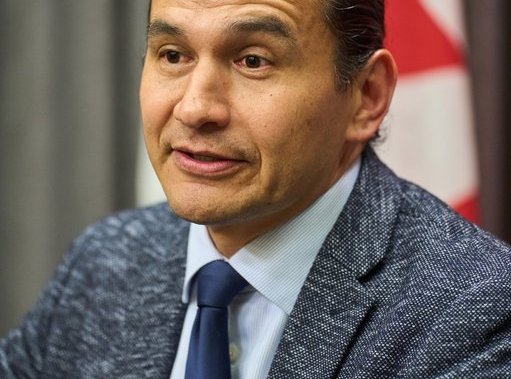Standing on the war-damaged streets of Kharkiv Oblast in eastern Ukraine last month, I couldn’t help but notice the strange mix of destruction and determination. Buildings reduced to rubble sit beside makeshift community centers where locals gather to plan their future. Now, help is coming from an unexpected source – the Canadian prairie province of Manitoba.
The Manitoba government announced Wednesday a significant commitment to support reconstruction efforts in Kharkiv Oblast, launching the Manitoba Ukraine Reconstruction Support Initiative with an initial $5 million investment. This partnership marks one of the first province-to-region recovery agreements between Canada and Ukraine since Russia’s full-scale invasion began in February 2022.
“When I visited Ukraine last summer, I witnessed firsthand the resilience of Ukrainian people,” Manitoba Premier Wab Kinew said during the announcement in Winnipeg. “This isn’t just about rebuilding infrastructure – it’s about helping restore hope and dignity to communities that have suffered immense hardship.”
The initiative comes at a critical moment. According to United Nations data, over 30% of Ukraine’s infrastructure has been damaged or destroyed during the ongoing conflict, with reconstruction costs estimated at over $486 billion. Kharkiv Oblast, sharing a border with Russia, has endured some of the most severe damage due to its strategic location.
Manitoba’s Ukrainian connection runs deep. The province is home to nearly 180,000 people of Ukrainian descent – about 15% of Manitoba’s population – representing one of the largest Ukrainian diasporas in Canada. This demographic reality has translated into significant political and cultural support for Ukraine since the war began.
Oleksandr Kubrakov, Ukraine’s Deputy Prime Minister for Restoration, joined the announcement virtually from Kyiv. “Regional partnerships create direct, efficient pathways for reconstruction assistance,” Kubrakov explained. “The Manitoba initiative will help us rebuild homes, schools, and critical infrastructure in communities that desperately need stability.”
The program will focus on several priority areas, including rebuilding social infrastructure, restoring water and energy systems, and providing humanitarian aid to displaced persons. Manitoba officials will work directly with Kharkiv regional authorities to identify the most urgent projects.
“We’ve seen similar province-to-region approaches work effectively for European partners,” said Andriy Shevchenko, former Ukrainian ambassador to Canada, who I spoke with following the announcement. “This model reduces bureaucratic obstacles and creates meaningful connections between communities on both sides.”
The initiative isn’t Manitoba’s first contribution to Ukraine. Since 2022, the province has provided over $800,000 in humanitarian assistance and welcomed approximately 15,000 Ukrainian newcomers through Canada’s emergency visa programs.
What makes this new program distinctive is its long-term commitment to reconstruction rather than immediate relief. According to provincial officials, the funding will be distributed over three years, allowing for sustainable planning rather than one-time interventions.
For Natalia Pyvovarova, who fled Kharkiv with her two children in 2022 and now lives in Winnipeg, the announcement brings mixed emotions. “I’m grateful to see Manitoba helping rebuild my home region,” she told me during a community gathering at the Ukrainian Cultural Centre. “But it’s painful to know that the destruction continues even as we try to rebuild.”
Indeed, recent Russian missile strikes have damaged newly repaired energy infrastructure in Kharkiv, highlighting the challenges of reconstruction during an active conflict. The Ukrainian government estimates that approximately 50% of the country’s energy infrastructure has been damaged or destroyed.
Manitoba’s initiative joins a growing network of international support for Ukraine’s reconstruction. The World Bank has mobilized over $37 billion in emergency financing, while the European Union has committed €50 billion through 2027. However, experts emphasize that regional partnerships like Manitoba’s provide nimbler, more targeted assistance.
“Large institutional donors sometimes struggle with bureaucratic constraints,” explained Dr. Maria Popova, associate professor of political science at McGill University. “Province-to-region partnerships can identify precise local needs and deliver assistance more efficiently.”
Manitoba’s strong agricultural sector may provide additional benefits beyond financial support. The province’s expertise in farming technology could help revitalize Ukraine’s agricultural capacity, which has been severely impacted by the war. Ukraine’s agricultural exports, once accounting for 40% of the country’s export revenue, have declined significantly due to mining, equipment destruction, and Black Sea shipping disruptions.
The initiative has received broad political support within Manitoba, with opposition parties endorsing the government’s approach. However, some critics question whether the $5 million commitment is sufficient given the scale of destruction.
“This is a meaningful first step,” said Roman Sawycky, president of the Ukrainian Canadian Congress Manitoba Provincial Council. “But reconstruction needs will continue growing the longer this war persists. We hope this initial commitment will expand as the partnership develops.”
As the sun set over Winnipeg’s legislative building Wednesday, Ukrainian flags flew alongside Canadian and Manitoba emblems – a visual reminder of the deep connections between these distant places. For communities in Kharkiv Oblast, Manitoba’s support represents more than dollars and cents; it signals that they haven’t been forgotten.
“When you’ve lost everything, knowing someone halfway across the world cares enough to help you rebuild – that matters,” Pyvovarova reflected. “It gives people a reason to stay and fight for their future.”






